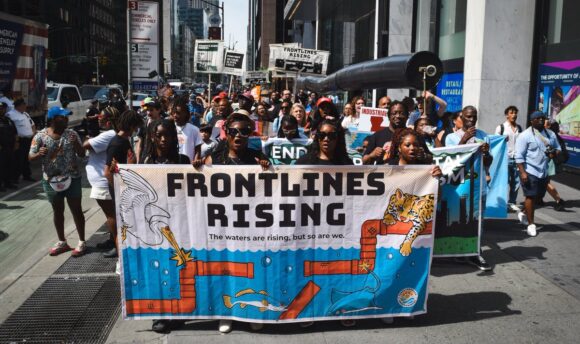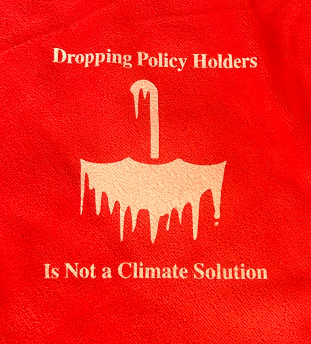Aspen joins sixteen companies that have ruled out insuring Trans Mountain
London, UK (April 21, 2022) – Trans Mountain insurer and Lloyd’s of London syndicate Aspen Insurance has pledged to cut ties with the existing Trans Mountain tar sands pipeline when its current insurance policy expires this summer. Aspen joins sixteen insurance companies that have dropped Trans Mountain or vowed not to insure the Trans Mountain Expansion Project.
In an email to Coal Action Network, a spokesperson for Aspen stated: “As a matter of corporate policy, Aspen does not comment on the specifics of any application for insurance we receive, any insurance or reinsurance contract we underwrite, or any claim we pay, however, we can confirm that we do not plan to renew the Trans Mountain Tar Sands Oil Pipeline project.”
“By confirming that they are dropping Trans Mountain, Aspen is joining insurance industry leaders in recognizing that fossil fuel infrastructure projects that don’t have Free Prior and Informed Consent are a material risk. It’s time for the rest of the Lloyd’s syndicates and the whole insurance sector to follow suit before the climate crisis gets worse."
A growing number of insurers have recognized the massive risks of the 69-year-old Trans Mountain pipeline and the oil expansion project, which would increase emissions equivalent to adding 2.2 million cars to the road and has been delayed for years in the face of Indigenous-led resistance.
According to recent numbers from the Canadian Ministry of Finance, the projected cost of twinning the Trans Mountain pipeline has nearly tripled. The latest figures show that the current price tag is approximately CA$21.4 billion, and the federal government pledged that it would not give any more money to the pipeline.
“The Intergovernmental Panel on Climate Change and the International Energy Agency reports have made clear that the Trans Mountain expansion project and any expanded oil and gas infrastructure is incompatible with achieving global climate targets. Since this campaign was launched seventeen insurers have ruled out insuring Trans Mountain, including Chubb and Argo Group in 2021, citing climate, environmental, and social risks.”
In the UK, Lloyd’s of London has been the target of a range of protests around the Trans Mountain pipeline including 60 people from Extinction Rebellion blocking the entrances at their iconic headquarters last week and a climate memorial led by Pacific Islanders and youth strikers from climate change-affected communities.
“Over the last two years, insurers at Lloyd’s of London have come under increasing pressure to cut ties with Trans Mountain. It’s brilliant that Aspen is listening, but Lloyd’s syndicates like Arch and Beazley must follow suit, and more broadly we need a step change across the whole Lloyd’s marketplace. We are calling for leadership that mandates all insurers in their marketplace to end underwriting of new fossil fuel projects. While Lloyd’s CEO John Neal blocks meaningful climate action, we expect to see ongoing protests on Lloyd’s doorstep.”
In February 2021, the Canadian-owned Trans Mountain corporation petitioned the Canada Energy Regulator to keep the names of its insurance backers secret, stating that it had “observed increasing reluctance from insurance companies to offer insurance coverage for the Pipeline and to do so at a reasonable price.” The Canada Energy Regulator approved the request on April 29, 2021, and Trans Mountain’s most recent insurance certificate was publicly filed with the insurance company names redacted. The latest insurance certificate will be filed in the next 9 days, and it is also likely to be redacted.
On the 2019-20 insurance certificate, which is the last available one with company names listed, Lloyd’s syndicates collectively were the biggest insurer to the project. Chubb and Zurich were the biggest individual insurers listed providing coverage, but since then, both Chubb and Zurich have cut ties, making Lloyd’s a remaining top target
To date, more than seventeen insurance companies have adopted tar sands exclusion policies, which is having a tangible impact on the price and availability of insurance for the sector.
“This announcement from Aspen makes clear that the Trans Mountain pipeline network is facing serious risks that financial institutions do not want to support: lack of consent from Indigenous communities, decaying infrastructure, mounting costs, and a massive carbon footprint. However, we urge Aspen to clarify that its commitment extends to not insuring all parts of the existing Trans Mountain pipeline and the expansion project in the future. We also call on Arch, Beazley, and other Lloyd's syndicates to follow suit and drop Trans Mountain, as well as rule out insurance coverage for the entire tar sands sector. History will not look kindly on any company that is continuing to insure massive oil expansion projects in 2022."
Companies named on previous insurance certificates that have yet to rule out continued support for the project or the tar sands sector include Energy Insurance Limited, Liberty Mutual, Lloyd’s of London and syndicates, Starr, Stewart Specialty Risk Underwriting, and W.R. Berkley.
This Thursday, April 21, Coal Action Network and partners are hosting a virtual Peoples AGM, in the lead up to Lloyds of London actual Annual General Meeting on May 9.
ADDITIONAL BACKGROUND
- Lloyd’s of London is an insurance marketplace made up of around 80 insurance companies who together insure some of the riskiest and most controversial projects in the world. Lloyd’s syndicates are likely the lead insurers for the existing Trans Mountain pipeline for 2021-22. In December 2020, the Lloyd’s marketplace adopted a weak policy restricting involvement with tar sands projects like Trans Mountain’s pipelines, asking insurance companies that operate within Lloyd’s to not provide new insurance cover for tar sands projects by 2022, but the policy is unclear on how stringent the requirements will be enforced. Furthermore, it allows for continued coverage for the tar sands sector until 2030.
- If built, the Trans Mountain Expansion Project would transport an additional 590,000 barrels of tar sands oil per day from Alberta to British Columbia, and lead to a 700% increase in oil tankers in the Salish Sea. Many Indigenous communities have consistently and repeatedly rejected the Trans Mountain pipeline and tanker project, but the Canadian government has continued to move forward with construction.



